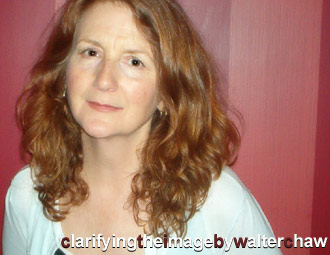 Sally Potter reflects on her films
Sally Potter reflects on her films
YES
*½/**** |
|
A loaded word, "pretentious," and one that I think is overused, but whatever its dictionary definition, to me the idea of "pretentious" has a lot to do with the ratio of intent to teach vs. what's actually taught. From The Tango Lesson to The Man Who Cried to Orlando, Sally Potter's films have generally been admirably high on ambition if lamentably low on insight: You can make a film about how cinema is protean and existentially thorny, but unless there's a greater purpose to that insight, it's just first-year film school mixed with a little first-year biology. Take Yes, a picture concerned with lenses and reflective surfaces–written in the high style, The Bard's own iambic, but not so much in play form as in couplets (call it "playful" playwriting)–featuring not only an agile (and game) cast, but also a boatload of pretensions that lead the viewer to the conclusion that what Potter believes is very interesting is only very interesting to her. Trapped in a loveless marriage with Anthony (Sam Neill), "She" (Joan Allen) is having a torrid affair with "He" (Simon Akbarian); she's people are from Belfast, He's are from Beirut, and throughout the tension of He/She is set against the three-R archetypes of polarity: race, religion, and region. Potter uses different film stocks to express disconnection, Antonioni's framing tactics to express the same, and a handful of soliloquies delivered on the so-called fourth-wall-breaking proscenium by a taciturn maid (Shirley Henderson) that explain the Brownian motion of the motes that open the piece, the microbes She examines in her day job, and the ultimate deconstructionalist rationalization that for all this talk of difference, it's just a matter of semantics. Yes is thus film about language and communication at mortal war with true emotion and protean thought, boasting a lot of arresting images and briefly interesting ideas that unfortunately deflate when it becomes clear that a pretty picture and a clever turn mask subterranean drafts of aimless, circular comings and goings and talk of Michelangelo.–WC
|
July 3, 2005|A chat in the basement of Denver's Hotel Monaco with the loquacious, eloquent Sally Potter wrapped three interviews in three days, not counting the one with Gregg Araki conducted via e-mail, which was apparently pre-screened by someone (a first in my experience, as I've never interviewed Brad Pitt or Angelina Jolie) at tiny distributor Tartan and has not, since a minor blow-up on my end, been completed as promised by the "maverick" director. Whether he was offended, put-off, or frightened by the questions, if they even got to him, I'm not sure (maybe he's just too busy with his alien-abduction comedy to honour his commitment), but I'll be honest, I'm finding it hard to give a shit. Less to transcribe. I ask them all and filmmakers, to a one, complain about how far the art of film criticism has fallen in the United States, about how it's consumer reportage nowadays instead of an invitation to a conversation and those tentative early steps towards immortality. But a mouth has two corners, and you talk out of one in righteousness and the other in insecurity; although I provide an outlet for the outrage of the artist jilted at the hands of one too many clever wordsmiths, I also get the sense that most of these film professionals would prefer getting the junket line to any actual serious inquiry into their work.
Credit Sally Potter, then, for having the guts to discuss what her work is actually about. They're pretentious, her films, they're always meaningful and they always strike me as trying too hard to impress an imaginary demographic. Ironically, Potter's pictures underline the truism that artist intentionality is a decent place to start an autopsy but a horrible place to end one. In her case, without the auteur theory, there's nothing to say, and so it is with her latest film, Yes, another of Potter's examinations of the meta-quality of film-within-film and the cinema as a medium of projection and inversion. Written in couplets of proto-Shakespearean iambic pentameter (done with more liquid realism–and fewer rhymes–on HBO's "Deadwood"), it's an intriguing experiment for a good half-hour before its usefulness as a glass held to language diminishes, leaving a soggy, vaguely orientalist romance to hold as its symbolic centre. Give her due for being courageous enough to make a picture so unapologetically rigorous in its intellectualism, particularly in an age when "nuance" is effete and the most minor critical analysis is seen as an unforgivable offense to God and country. Potter is articulate and gracious in explaining what she's getting at in an environment grown too comfortable with not getting at anything at all.

 by Walter Chaw
by Walter Chaw ****/**** Image
****/**** Image  by Walter Chaw
by Walter Chaw